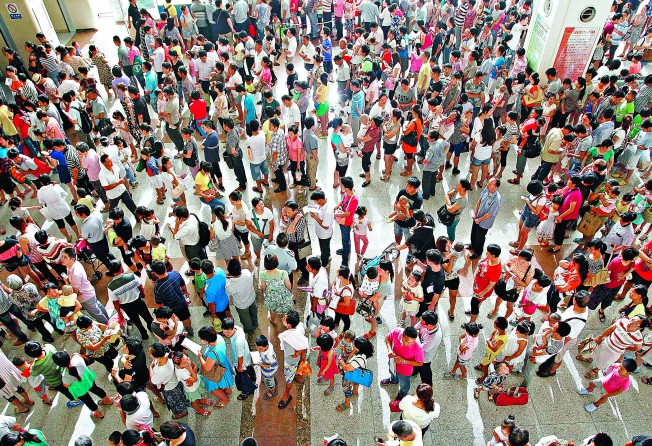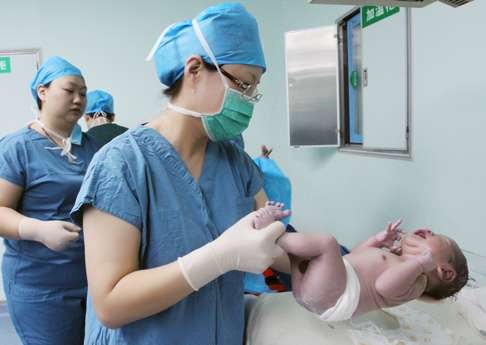
Are China’s mobile medical apps just what the doctor ordered?
Mainlanders often line up for days or pay big fees to scalpers for appointments at leading hospitals, but investors say a solution may be to go mobile

One of the first things patients in China think about when they get ill is how they can see a top doctor at a major hospital.
Appointments to see specialists at leading hospitals in metropolises such as Beijing and Shanghai are sought after because people from around the country flood to these institutions, without the need for any referral.
The authorities have tried various ways to ease the demand, without any obvious progress. But the business world now seems to be offering a solution – one just a click away via a phone.
Over the past two years, more than 100 health-related “mobile medical” smartphone apps have been launched, which offer services from free or fee-based medical consultations, doctor appointments, personal health management, to health tips.
Health-care spending in China is expected to exceed US$1 trillion by 2020, according to a report from McKinsey. Analysts estimate it will become the second-largest market for pharmaceuticals in the world in 2016.

These firms’ product designs ... don’t offer concrete solutions to solving their clients’ most-desired requirement – easy access to top doctors
“These firms’ product designs remain something ‘magnificent and vague’, but don’t offer concrete solutions to solving their clients’ most-desired requirement – easy access to top doctors,” said Guo Yang, a medical industry analyst at the market consultancy firm, Analysys International.
In February a video of an angry woman complaining that she could not get an appointment at a top Beijing hospital despite queuing for two days went viral on the nation’s social media. It touched a nerve with many people, who had had similar experiences and ended up paying thousands of yuan to scalpers for a hospital appointment with a doctor that had cost less than 500 yuan (HK$595).
Chunyu Doctor, a leading mainland medical app with 91 million “active” users, is registered with 410,000 doctors that work full-time at mid-range or higher public hospitals.
Chunyu also opened 300 brick-and-mortar hospitals by buying all or parts of hospitals over the past year.

The state’s attitude of encouraging doctors to practise medicine at different sites had boosted the development of the industry, making it easier to recruit doctors as part-time workers on the online platform, Liu said.
The apps are cooperating with hundreds of hospitals, have hundreds of thousands of doctors registered with them and millions of client. This kind of offline resource is in keeping with investors’ strategy
“For patients it also stands them in good stead,” Liu said. “People have more chance of getting access to elite doctors by paying a little more money, rather than queuing for hours, or paying high commissions to scalpers.”
Yet not all patients favour the new business model. Shanghai resident Chang Liping, 35, who has had menstrual problems for years, has little confidence in the apps after a free consultation with a doctor via one medical app (not Chunyu), who said she was fine.
“In the past I regularly went to Shanghai Yueyang Traditional Chinese Medicine (TCM) Hospital, one of the three best TCM facilities in the city,” she said. “Doctors there told me my illness shouldn’t be neglected and I needed to consume herbal soup every day.
“The doctor I consulted via the app said my condition was fine. I don’t trust the app doctor.”
She also said some hospitals did not accept appointments booked using medical apps.

“Competition among hospitals is tough,” Lu said. “Four to five patients seek treatment at my department each month after consulting with me online.”
People have more chance of getting access to elite doctors by paying a little more money, rather than queuing for hours, or paying high commissions to scalpers
An unnamed propaganda official at Zhengzhou People’s Hospital, which has joined Alibaba’s “future hospital initiative”, told Caixin.com that most of its patients’ experiences at the hospital were not affected as they were older and did not use the Alipay app.
The Alibaba initiative, linked to hundreds of mainland hospitals, enables patients to swipe mobile phones installed with the Alipay app to book appointments with doctors at these hospitals, pay medical bills, read medical check-ups and also interact with doctors after receiving treatment.
Alibaba’s arch-rival, Tencent, has invested US$100 million in major doctor appointment website, Guahao.com, reportedly with links to 100,000 mainland doctors and 37 million users.
Tencent has also teamed up with 60 hospitals in Guangzhou so patients can secure hospital appointments and pay medical fees through its smartphone social app, WeChat.
Ping An Group has launched its Ping An Good Doctor app, with about 1,000 full-time doctors providing free consultations.
Guo said the industry was still in the exploration stage, but was attracting investors who valued these firms’ medical resources.
“The apps are cooperating with hundreds of hospitals, have hundreds of thousands of doctors registered with them and millions of clients,” Guo said.
“This kind of offline resource is in keeping with investors’ strategy.”